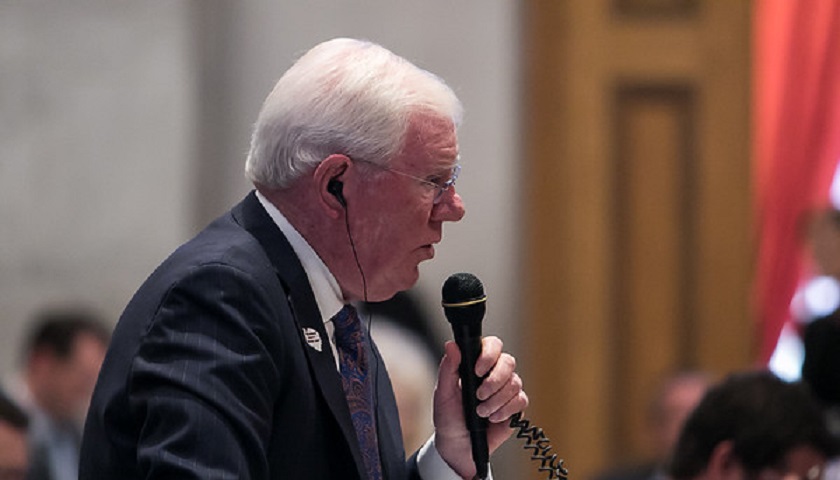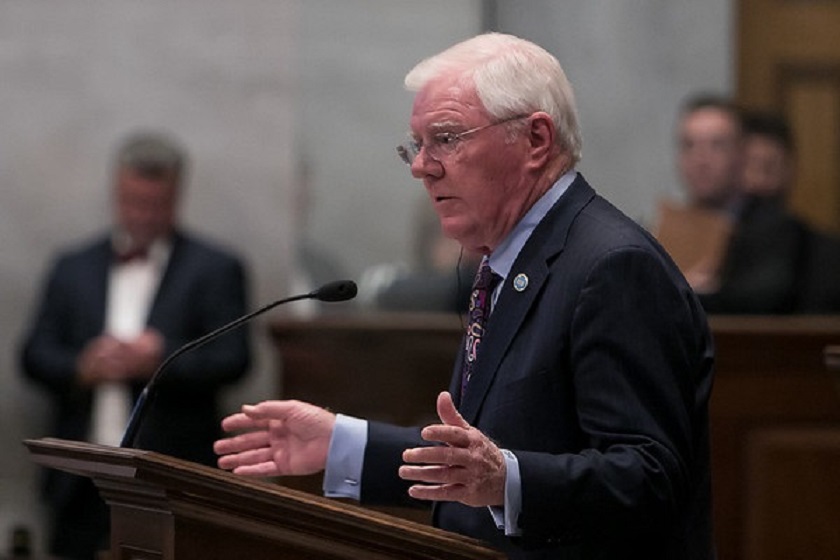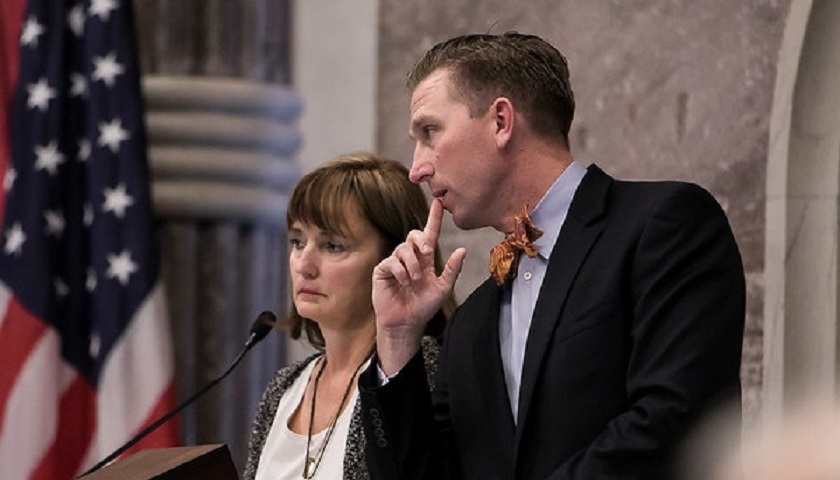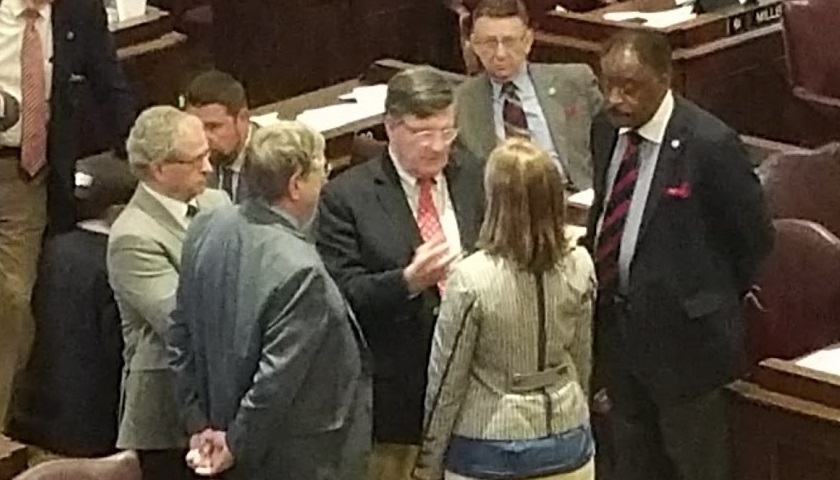House Finance Chairman Charles Sargent (R-Franklin) on Friday stripped an amendment to the budget bill, HB 511, that would have given $3.12 million to veterans, opting instead for a pork project in Williamson County. On Thursday during House debate on the budget, Rep. Jimmy Matlock (R-Lenoir City) introduced an amendment that redirected $3.12 million from the Historical Commission for the demolition and construction of a new Carter House Visitors Center in Franklin to four Tennessee chapters of Honor Flight and Honor Air programs across the state. These non-profit organizations fly aging veterans to Washington, D.C. in order for them to pay their final respects the memorials dedicated to their sacrifice and to their fellow soldiers who died in battle. Top priority is given to the senior veterans, World War II veterans, survivors, people who have given their all. Many of these veterans could be disabled, handicapped, or even terminally ill. Sargent initially tried to kill the amendment by making the motion to “lay on the table,” but the motion failed by a vote of 35 ayes, 52 nays. Despite the disagreement throughout much of the day, this amendment passed with bipartisan support on Thursday with a vote of 49 ayes and 36…
Read the full storyTag: Sargent
Commentary: Finance Chair State Rep. Charles Sargent Misrepresented Copeland Cap on House Floor in Budget Debate
During his presentation of the budget bills during the House floor session Friday State Representative and Chairman of the House Finance, Ways & Means Committee, Charles Sargent (R-Franklin) misrepresented the Copeland Cap constitutional amendment several times. Charles Sargent has served in the Tennessee House since 1997, became a member of the House Finance, Ways & Means Committee in 2003, Vice-Chairman in 2009, and Chairman in 2011, a role in which he continues to serve. The 1978 amendment to Article II, Section 24 of the Tennessee constitution, named for its sponsor former Representative David Copeland, states, “In no year shall the rate of growth of appropriations from state tax revenues exceed the estimated rate of growth of the state’s economy as determined by law.” In the specific case of Sargent presenting HB 514 to the House membership for passage as part of the budget, the operative word is “appropriations,” when referring to growth by the state, not revenues as Sargent maintains throughout the discussion on the bill. According to Merriam-Webster, the definition of appropriation is “money set aside by formal action for a specific use,“ whereas the definition of revenue is “the yield of source of income (such as taxes)…
Read the full storyHouse Passes Governor Haslam’s $37 Billion State Budget in Anticlimactic Ending
After much drama, heated exchanges on the floor, a tense caucus meeting on Thursday, it seemed that Friday’s floor session to address the fiscal year 2017-18 budget was not starting off much better when there were not enough members present for a quorum at 9:07 a.m. But, by 11:23 a.m. the four bills that made the state $37 billion 2017-18 budget had been passed by the House. When a quorum was not detected by 9:07 a.m., Republican Caucus Leader Ryan Williams (R-Cookeville) requested a recess until 10 a.m. for the purpose of a caucus meeting, which took place in the library. The caucus meeting was quickly turned over by Williams to House Majority Leader Glen Casada (R-Franklin), who reviewed the process for the day. Casada explained that there would be two amendments to the budget appropriations bill, the first being a “stripper” amendment, which would take off all of the additional appropriations to HB 511 approved Thursday. The second was the addition of a $55 million non-recurring appropriation to counties taken from the Highway Fund for the purpose of “kick starting” road work. Casada also mentioned the possibility of a third amendment, but was reluctant to share details until he was…
Read the full storyHouse of Representatives In Turmoil Going Into Day Two of Budget Review
NASHVILLE, Tennessee — After nearly a six and a half hour day, the Tennessee House of Representatives appears to be no closer to having a finalized budget for fiscal year 2017-18 when it goes back into session Friday at 9 a.m., as the first bill to approve the budget appropriations did not make it to a vote on Thursday. As the first legislative year of the 110th General Assembly draws to a close, the last of the bills are being heard and the budget for fiscal year 2017-18 needs to be approved. The budget passed the House Finance Ways & Means Subcommittee and full Committee on Wednesday and was placed on the calendar for the House floor session to convene at 9 a.m. Thursday. After dozens of resolutions and bills were passed, but prior to the discussion of the four bills that make Governor Haslam’s budget for the upcoming fiscal year, at 10:34 a.m., Republican Caucus Chairman Ryan Williams (R-Cookeville) requested a recess until 11:30 for a caucus meeting. While a handful of members responded with their own comments, the real purpose of the Republican caucus meeting was to allow “leadership” to “encourage” support of the budget. Leadership was…
Read the full storyHouse Finance Ways and Means Committee Votes to Break The Copeland Cap
At the final stop before the full House makes its first of three votes on Governor Haslam’s 2017-18 $37 billion state budget, the Finance, Ways & Means Committee finalized the bills required to move the budget on, including HB 514, which Chairman Charles Sargent (R-Franklin) referred to as the “indexing bill” or Copeland Cap. The Copeland Cap is the 1978 amendment to Article II, Section 24 of the Tennessee constitution that states, “In no year shall the rate of growth of appropriations from state tax revenues exceed the estimated rate of growth of the state’s economy as determined by law.” The amendment was named for its author, former state Representative David Copeland of Ooltewah. As reported by The Tennessee Star, with the growth of state revenues, lawmakers were expected to have to break the Copeland Cap. That was confirmed Wednesday, when Chairman Sargent presented the bill to the committee, saying, “Revenues have grown and collections in the 16 budget that was not recognized in 16. That money has been placed over into the 17-18 budget. So we have to recognized that we went over. We went over by 2.85 over and above the Copeland Cap.” No further details were provided as…
Read the full story



